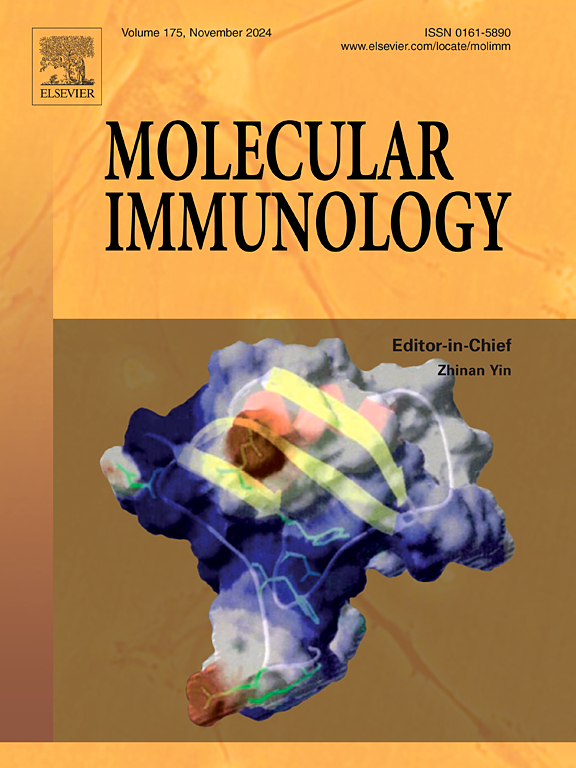非洲猪瘟病毒(ASFV) p30单克隆抗体的制备及新型抗原表位的鉴定
IF 3
3区 医学
Q2 BIOCHEMISTRY & MOLECULAR BIOLOGY
引用次数: 0
摘要
非洲猪瘟(ASF)是由非洲猪瘟病毒(ASFV)引起的一种高度传染性疾病,高毒株的死亡率高达100% %。ASFV p30蛋白由早期转录基因CP204L编码。p30作为ASFV的结构蛋白之一,是一种理想的ASF诊断抗原。本研究首先通过细胞融合从免疫的BALB/c小鼠中获得3种特异性p30的单克隆抗体(mab),并成功应用于ELISA、Western blotting和免疫荧光分析。其次,采用Western blotting方法鉴定p30的两个新的抗原表位169TIYGTPLKE177和111ETNECTSSFET121。鉴定的两个表位在基因型I和/或II asfv中高度保守。第三,建立了一种基于p30表位肽的间接ELISA,可有效检测ASFV感染期间的抗体。本文章由计算机程序翻译,如有差异,请以英文原文为准。
Preparation of African swine fever virus (ASFV) p30 monoclonal antibodies and identification of novel antigenic epitopes
African swine fever (ASF) is a highly infectious disease caused by African swine fever virus (ASFV), with a mortality rate of up to 100 % for highly virulent strains. The ASFV p30 protein is encoded by the early transcriptional gene CP204L. As one of the structural proteins of ASFV, p30 is an ideal diagnostic antigen for ASF. Here, we first generated three monoclonal antibodies (mAbs) specific for p30 from immunized BALB/c mice via cell fusion, which were successfully applied in ELISA, Western blotting, and immunofluorescence assay. Second, two novel antigenic epitopes, 169TIYGTPLKE177 and 111ETNECTSSFET121 of p30 were identified using Western blotting with the three p30 mAbs. The two epitopes identified were highly conserved across genotypes I and/or II ASFVs. Third, an indirect ELISA based on epitope peptides of p30 was established to effectively detect antibodies during ASFV infection.
求助全文
通过发布文献求助,成功后即可免费获取论文全文。
去求助
来源期刊

Molecular immunology
医学-免疫学
CiteScore
6.90
自引率
2.80%
发文量
324
审稿时长
50 days
期刊介绍:
Molecular Immunology publishes original articles, reviews and commentaries on all areas of immunology, with a particular focus on description of cellular, biochemical or genetic mechanisms underlying immunological phenomena. Studies on all model organisms, from invertebrates to humans, are suitable. Examples include, but are not restricted to:
Infection, autoimmunity, transplantation, immunodeficiencies, inflammation and tumor immunology
Mechanisms of induction, regulation and termination of innate and adaptive immunity
Intercellular communication, cooperation and regulation
Intracellular mechanisms of immunity (endocytosis, protein trafficking, pathogen recognition, antigen presentation, etc)
Mechanisms of action of the cells and molecules of the immune system
Structural analysis
Development of the immune system
Comparative immunology and evolution of the immune system
"Omics" studies and bioinformatics
Vaccines, biotechnology and therapeutic manipulation of the immune system (therapeutic antibodies, cytokines, cellular therapies, etc)
Technical developments.
 求助内容:
求助内容: 应助结果提醒方式:
应助结果提醒方式:


